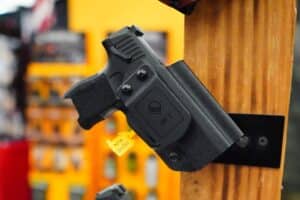The federal ban on firearms possession in post offices is unconstitutional.
In a Saturday ruling, US District Judge Kathryn Kimball Mizelle determined that the blanket ban violated the Second Amendment rights of a former postal employee who was charged with illegally possessing a gun in a federal facility. She dismissed part of the man’s indictment after concluding that a total gun ban in post offices is “incongruent with the American tradition of firearms regulation.”
“The Supreme Court has been clear: the government must point to historical principles that would permit it to prohibit firearms possession in post offices,” Judge Mizelle wrote in United States v. Ayala. “The United States fails to meet that burden. Thus, I dismiss the § 930(a) charge because it violates Ayala’s Second Amendment right to bear arms.”
The ruling marks the latest ruling to call into question federal gun prohibitions since the Supreme Court handed down its New York State Rifle and Pistol Association v. Bruen opinion in 2022. That decision officially recognized an individual constitutional right to carry a firearm in public for self-defense. It also established a new test for evaluating firearm restrictions based on the nation’s historical tradition of gun laws dating back to the time of the country’s founding. Modern laws that don’t comport with that tradition, including many location-based “sensitive place” restrictions, have since come under renewed scrutiny by gun-rights advocates and defense attorneys alike.
Saturday’s decision centered around Emmanuel Ayala, a US Postal Service truck driver in Tampa, who had a Florida concealed carry permit and often carried a 9mm handgun in a fanny pack for self-defense during the course of his duties, according to his legal team. In September 2022, Ayala allegedly entered his post office carrying his firearm when he was stopped by two federal postal agents who attempted to detain him. Prosecutors said Ayala fled from the agents but was eventually arrested by officers with the Tampa Police Department. A grand jury subsequently indicted him for knowingly bringing a firearm into a Federal facility and for resisting arrest. Ayala’s legal team filed to have his gun charges dismissed as unconstitutional.
Judge Mizelle, a Donald Trump appointee, said the post office gun ban is out of line with how the Founders regulated gun carry.
“Post offices have existed since the founding, as have threats to the safety of postal workers and the public entering those locations,” she wrote. “Yet the historical record yields no ‘distinctly similar historical regulation addressing’ those safety problems by regulating firearms in post offices.”
She also noted that the government failed to produce any other “relevantly similar analogue” from the past that could be used to justify the modern ban on guns at post offices. She argued that founding-era laws regulating weapons in legislatures, polling places, and courthouses cited by prosecutors missed the mark.
“The United States’ historical examples are not relevantly similar to § 930(a) in several important ways,” she wrote. “For example, § 930(a) completely forbids possession in most government buildings. By contrast, the Maryland legislative assembly bans applied only when the legislature was in session, and the Delaware election law governed polling places only on election day. These regulations contained meaningful time and place constraints; they were not perpetual exceptions to the right to bear arms.”
Judge Mizelle also raised practical issues with the scope of the federal facilities gun ban and its impact on the right to keep and bear arms. Because the statute bans guns in any building owned or leased by the Federal Government, she argued that the inevitable growth of government property risks regulating the Second Amendment “into practical non-existence.”
“The plain language captures everything from the White House to toll booths in national parks to Social Security Administration buildings,” she wrote. “At some point, when twenty-eight percent of land in the United States is owned by the federal government and many ordinary activities require frequenting a ‘Federal facility,’ the government’s theory would amount to a nullification of the Second Amendment right altogether.”
She ultimately dismissed Ayala’s indictment under § 930(a) with prejudice. She did not, however, dismiss his charge for resisting arrest.
Additionally, the ruling only applies directly to Ayala and doesn’t include an injunction against generally enforcing the federal prohibition. But the ruling may make prosecutors less likely to pursue similar charges in Judge Mizelle’s district or across the country as it casts serious doubt over the underlying law’s constitutionality.
The Department of Justice did not respond to a request for comment.






